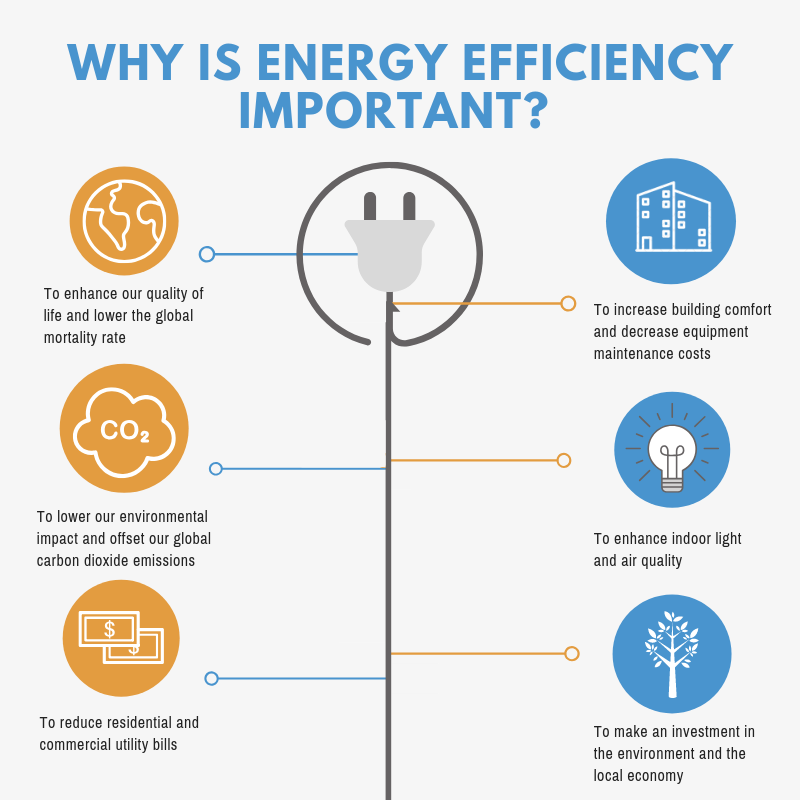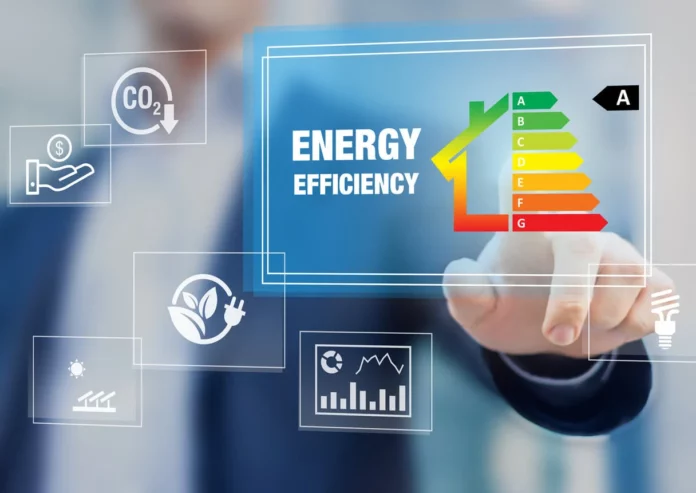Energy efficiency focuses on using less energy to achieve the same result. This eliminates waste and reduces costs.
It’s easy to think of energy efficiency as something big, like swapping out light bulbs. Still, it’s also one of the most cost-effective ways to fight climate change, improve air quality, help families meet their budgets, and boost businesses’ bottom lines.
It’s Good for the Economy
Energy efficiency benefits the economy by increasing productivity, boosting competitiveness, and creating jobs.
Energy efficiency investments can improve Gross Domestic Product (GDP), energy intensity, and worker productivity, lower costs and bills for businesses and households, reduce reliance on foreign energy sources, cut greenhouse gas emissions, and more.
Energy-efficient products cost more than their less-efficient counterparts, but long-term energy savings typically offset the higher upfront price.
For example, a highly efficient electric heat pump water heater might cost more than an older model but will save over $3,500 in energy costs over its lifetime.
For families, implementing upgrades to conserve energy like better insulation and new appliances can lessen their energy burdens, making the home and heating bills more affordable.
This can help families avoid the difficult choice between paying for energy and putting food on the table, and it improves the comfort, health, and safety of their homes.
Energy efficiency also provides indirect benefits such as increased occupant productivity, reduced asthma and other respiratory conditions, fewer home fires and safer buildings, a lower risk of thermal stress cold, decreased healthcare costs, and more.
In addition, the energy savings from reducing electricity demand can help maintain adequate reserve margins to prevent costly grid outages that affect everyone in the community.
RELATED: Top 10 Innovative Approaches to Addressing Climate Change
It’s Good for the Environment
Energy efficiency is using less energy to do the same task, which can mean changing your light bulbs to turning off a dishwasher or washing machine when you aren’t using them.
It’s also about finding ways to use the energy you do have more wisely. For example, doing one full load of laundry each week rather than several small loads can save energy and water.

Many know swapping traditional incandescent light bulbs for LEDs will help reduce their electricity bills. However, only some know it will cut greenhouse gases (GHGs) and benefit the environment.
Boosting home and business energy efficiency is the cheapest way to lower our dependence on fossil fuels for power generation.
It reduces carbon dioxide, sulfur oxide, and nitrogen oxide emissions that cause air pollution and climate change and cuts demand for electricity at the household and economy-wide levels.
At the same time, energy efficiency improvements can reduce reliance on foreign energy sources, which may help mitigate the impact of political instability or natural disasters on U.S. energy supplies.
And energy-efficient homes, buildings, and appliances help conserve limited natural resources such as trees, coal, and oil by reducing the demand for these finite fossil fuels.
This is particularly important for marginalized communities and populations who face increased health risks from air pollution.
It’s Good for Your Health
Energy efficiency has a variety of benefits for your health and well-being.
From reducing your risk of financial hardship to improving indoor air quality and mental health, these improvements can improve your home’s comfort while saving you money.
Using less energy means using fewer fossil fuels, reducing air pollution and greenhouse gas emissions.
In addition, it reduces the amount of energy being used at one time, which minimizes stress on the electric grid and prevents power disruptions.
Moreover, when your home uses fewer resources, it becomes better equipped to switch to renewable energy sources free from harmful pollutants and climate change risks.
Many low-income households struggle to pay their utility bills, especially when energy usage is high.
Healthcare facilities can be susceptible to changes in the cost of energy, as they have around-the-clock staff and life-saving equipment that needs a constant power supply.
Energy efficiency upgrades can help cut hospital energy costs and save valuable operating dollars for care services.
It’s Good for the Planet
Energy efficiency is a powerful tool in the fight against climate change.
Using less energy reduces demand on the nation’s power plants and limits the need to harvest oil, natural gas, coal, or other fossil fuels that produce greenhouse gases.
A simple example is turning off lights or using cold water when washing clothes.
Overall energy efficiency in homes, buildings, appliances, equipment, vehicles, and transportation can cut 550 million metric tons of carbon pollution annually by 2050 – the equivalent of the emissions from all the passenger cars on U.S. roads in 2016.
This is a significant reduction that can be achieved through many easy and affordable measures, including installing efficient light bulbs, sealing leaks around windows and doors, making sure furnace filters are clean, and hunting down “energy vampire” electronics and devices that consume electricity even when they’re not turned on.
Achieving energy efficiency goals is also essential for ensuring our nation’s security and improving economic competitiveness by reducing our dependence on imports of fossil fuels.
In addition, boosting energy efficiency has many public benefits that may need to be reflected in individual consumer energy savings data, such as a decrease in air pollution that can help prevent diseases and the increased comfort and health of residents of efficiently-run buildings and neighborhoods.
Recommendation
What is PCR Packaging? Everything You Need to Know
Using PCR Materials Benefits For Our Planet and Your Company
Conclusion by Fix The Life
Energy efficiency is a cost-effective approach that focuses on using less energy to achieve the same result. It eliminates waste, reduces costs, and offers multiple benefits. It boosts the economy by increasing productivity, competitiveness, and job creation. It is good for the environment as it reduces greenhouse gas emissions, air pollution, and reliance on fossil fuels. Energy efficiency also improves health by minimizing air pollution and providing financial relief to households. Overall, energy efficiency plays a crucial role in fighting climate change, improving well-being, and preserving the planet for future generations.




